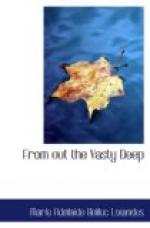And then, not for the first time in the last few days, the aunt began considering within herself the problem of her niece. Blanche had begun to like Donnington with a cordiality of liking which surprised herself. His selfless love for the girl touched her more than she had thought it possible for anything now to touch her worldly heart. And whereas she would naturally have considered a marriage between the penniless Donnington and brilliant, clever, popular Bubbles as being out of the question, she was beginning to feel that such a marriage might be, nay, almost certainly was, the only thing likely to ensure for Bubbles a reasonably happy and normal life. Blanche Farrow knew enough of human nature to realize that the kind of love Bill Donnington felt for her strange little niece was of a high and rare quality. It was very unlike the usual selfish, acquisitive love of a man for a maid. It was more like the tender, watching, tireless devotion certain mothers have for their children—it was infinitely protecting, infinitely forgiving, infinitely understanding.
Blanche sighed, a long, deep sigh, as she told herself sadly that no one had ever loved her like that—not even her old friend Mark Gifford. He had loved her long; in fact he rarely saw her, even now, without asking her to marry him. Also he had been, in his own priggish way, a very, very good and useful friend to her. But still, Blanche knew, deep in her heart, that Mark Gifford disapproved of her, that he often misunderstood her, that he was ashamed of the strength of the attraction which made him still wish to make her his wife, and which had kept him a bachelor. As long as this old friend had known her he had always written her a Christmas letter. The letter had not come this Christmas, and she had missed it. But Mark had no idea of where she was, and—and after all, perhaps his faithful friendship had waned at last from lack of real response.
And then, while thinking these rather melancholy, desultory thoughts, Blanche Farrow suddenly experienced a very peculiar sensation. It was that of finding herself as if impelled to look up from the embroidery-frame over which she was bending.
She did look up; and for a moment her heart—that heart which the way of her life had so atrophied and hardened—seemed to stop beating, for just behind Lionel Varick, whose head was still bent over his newspaper with a complete air of unconcern, interest, and ease—stood, or appeared to stand, two shadowy figures.
She shut her eyes; then opened them again—wide. The figures were still there, and they had grown clearer, more definite, especially the countenance of each of the two wraith-like women who stood, like sentinels, one on either side of the seated man.
Blanche gazed at them fixedly for what seemed to her an eternity of time. But even while, in a way, she could not deny the evidence of her senses, she was telling herself that she was really seeing nothing—that this extraordinary experience was but another exercise of Bubbles’ uncanny power.




